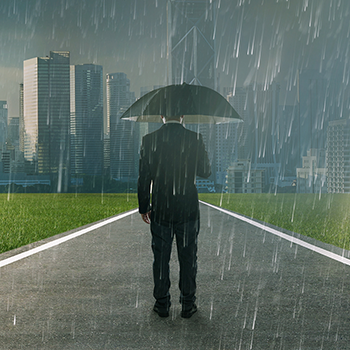Emily Attwood, Editor of Athletic Business, made a notable statement in her recent article “Preparing for Weather-Related Stadium Evacuation.”
Her point is clear, and we believe, the best way to start this article as well:
“Risks at sporting events such as active shooters, bomb threats and fan violence can all be lessened through proper security measures, ensuring a safer sporting event. However, another essential component of emergency action planning — severe weather — is harder to avoid.”
It’s true…
When it comes to adverse weather you spend more time mitigating than preventing. That’s not peace of mind.
Unfortunately, no one has control of the weather. Nevertheless, you can control its effects on the safety of your guests.
With the Academy for Venue Safety & Security’s (AVSS) 2016 Severe Weather Preparedness program tomorrow, this topic is timely.
Today, we’re going to share the methods, training tips, and progressive solutions we’re aware of.
Let’s get started, that way you can start preparing your team for what’s coming. Today’s a good day to be proactive.
9 Methods for Ensuring Everyone's Safety During Adverse Weather
We’ve worked with many of the best professionals in the industry and are able to use their insights to build great software that leads to proactive operations.
One of the biggest advantages of having access to so many experts is the access to a wealth of knowledge. Knowledge we use to share with all of you – our extended expert community.
Check out 9 methods for overcoming severe weather during your events that we organized from professionals just like you.
1. Event or Game Day- Upon determining that weather conditions will threaten the safety of guests and participants at an event, your Command Post operator will contact the Manager on Duty (MOD) and/or the Incident Management Team and the Event Promoter (that is, if time permits) to advise accordingly.
- The Command Post will advise the police department and event security to prepare to assist guests to move under shelter or to evacuate.
- A public announcement will inform the guests of the impending situation and their option to leave the property.
- Guests will be advised of safe areas to seek shelter in the property should such areas be available.
A public service announcement (PSA) will notify guests that a report of pending weather problems requires the event be canceled.
- Upon notice of evacuation, all security, ushers, maintenance, police, and fire rescue personnel shall go to their assigned evacuation posts.
- All food and merchandise vendors shall close their stands, secure their inventory and lock their cash drawers. Upon stand closure, all vendors shall exit the property to a specific location and assemble for headcount.
- Proceed to assigned gates as if the event were about to end, and open the gates. If a gate key is not available, one can be obtained from the event staff supervisor.
- Ensure that all gates are open. All turnstiles should be closed.
- Direct guests out of the property and make sure that guests do not re-enter the property.
- Position themselves near each exit from the seating areas as if the event were about to end, and assist in directing guests out of the property to the closest exit as quickly and efficiently as possible.
- Upon being relieved, reassemble with the supervisor at a specific location for headcount. Attendance will be taken.
- Position themselves at each exit to the ramps as if the event were about to end, and assist in directing guests out of the property as quickly and efficiently as possible.
- Calmly advise exiting guests that the escalators will not be working during an evacuation. The ramps must be used.
- Respond to the front of your section as if the event has ended.
- Direct guests out of their seating area toward the nearest exit as quickly and efficiently as possible.
- Assist the handicapped.
- Advise any handicapped in your area that in the case of an evacuation, the elevators will not be in service.
- Assist the police department with escorting officials from the field.
- Secure all playing field entrances to the ground level tunnel.
- Ensure that no one is allowed to re-enter the playing field except authorized personnel.
- Upon all personnel and officials exiting the property, and being relieved, reassemble with your supervisor for headcount.
- Parking operations should prepare to open all exit gates as if the event has ended.
- Parking operations should stand by for directives from the command post concerning blocking off the gate(s) and sections of the property perimeter road for use by emergency vehicles.
- Upon all vehicles leaving the property, parking operations will reassemble with supervisors for headcount.
When your team executes these protocols in an efficient way, you look good.
It’s important that your guests feel safe during this entire process. Your team’s confidence and ability to execute will ensure that.
OK, now the weather is over and your event is ready to proceed.
What happens now? You need to be prepared for the after-effects.
Rain causes puddles and wet spots, which lead to slip and falls. You need to be ready.
That means having well-trained staff in place. That’s next.
Well-Trained Staff Can Keep Everyone Whole
Here’s the thing, you need a high-performing team to execute these adverse weather methods with top-notch professionalism.
They must be ready for anything. You’ve heard of Murphy’s Law, right? Anything that can happen will happen.
The only question is, will you be ready for it?
If you want to be ready for what’s coming, you’ve got to set your team up for success.
Put in the effort to help them develop the knowledge. Teach them how to mitigate incidents that stem from the after-effects of adverse weather.
Integrate tabletop exercises into your training process to run through real-life scenarios.
Create these semi-fictional scenarios and test the capabilities of you and your team using the methods listed above.
And, if you’re attending the AVSS program – you can supplement it with your new training!
Teach your staff what you need them to know and how you need them to perform. Then, talk about it. Ask questions.
- How aware is your team? How aware do they feel? Can they identify potential hazards before they occur or escalate?
- Who do they communicate with first when an incident such as a slip and fall occurs? When someone is injured during an evacuation?
- Do they know how to use their incident management mobile app to follow protocols to handle? Can they properly communicate with the command center and others? Can they efficiently report an incident using the app?
Simply put, you want to deliver the best experience for your guests.
Then, take your trained staff and give them the best technology in the marketplace. It’ll increase your chances of keeping everyone whole during weather-related scenarios.
Incident Management Software to the Rescue
Training your staff to be proactive using these methods is a smart start.
But, staff will not remember every aspect of their training, especially when you implement a lot of protocols.
You need everything communicated effectively. You need all protocols to be efficiently executed too.
In order to gain real-time data and have communication throughout all your departments, you must put the right incident management infrastructure in place. Real-time communication is the only way to receive real-time data.
It’s crucial during severe weather, and during an emergency.
You want to minimize – or even eliminate – the effects poor communication and execution have on the safety of your guests.
Incident management software gives you the information needed during weather-related incidents.
Optimizing your incident management system by using incident management mobile apps will help your command center efficiently and effectively communicate protocols.
Your frontline staff can report incidents, in seconds, into your incident management system for streamlined communication.
You’ll have all the associated incident information in your system, and with a click of a button, the information will be transmitted to your entire team.
This leads to faster response times because everyone is being notified simultaneously – and without communication roadblocks.
The system captures all of the actions associated with an incident. Then, it communicates proper protocols to your teams.
Let’s say an incident occurs as a result of an evacuation.
With the system in place, your staff doesn’t hesitate. All of the need-to-know information populates on their mobile device.
Action is taken to mitigate the incident and the evacuation carries on.
Can you imagine the display of professionalism when this is simultaneously carried out on your property?
Here’s a useful scenario to put some perspective on what we’re talking about:
Severe weather is approaching your property.
For all intents and purposes, let’s say you run a large stadium.
Your command center meteorologist is present. They inform you that lightning is appearing on the radar approximately eight miles out.
First ask yourself…
Now, after learning the full importance of combining protocols, training, and progressive solutions into one strategy…what would be your next move?
You need to quickly communicate to all your departments and teams – now. They need to be ‘in the know’, right?
Timing is of the essence when it comes to the safety of your guests.
With improved communication, you’ll be able to inform your staff that it’s time to execute your property’s weather-related protocols.
You’ll need to have the protocols ready for your staff. Time is of the essence. They won’t have much time.
Scanning through a notebook or written version of your protocols is the last thing you or your team should be concerning themselves with.
Do you see how having predetermined methods, well-trained staff, and incident management software in place can help you overcome severe weather-related conditions at your property?
We hope it helps you achieve the peace of mind you deserve.
Over to You
Yes, we’ve talked about severe weather conditions, proper protocols, and solutions to use before. But, the great information recently made available by Emily Attwood and AVSS are important supplements.
From Emily’s article to the timing of the AVSS Severe Weather Preparedness program tomorrow, now is the perfect time for you to review your weather-related methods.
Do it to and be ready for what’s coming!
So, are you going to take the time to evaluate your methods for overcoming adverse weather conditions at your property?




